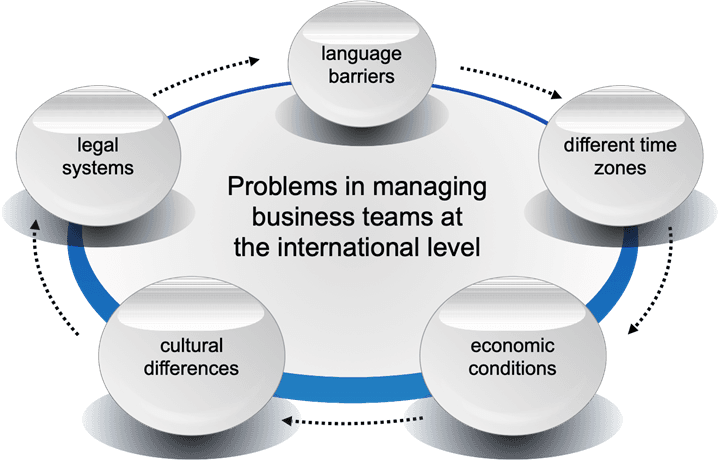Introduction
Based on the above data, it should be said that international business is quite developed today, the average number of employees in this industry reaches five thousand people. The average revenue in Belarus amounted to approximately $737 million. Therefore, this topic is relevant, and it is necessary to examine the existing features of companies' interactions on the international level. Today, culture influences various aspects of social life, including economics, politics, education, sports, and business. Many influential entrepreneurs and successful innovators recognize that addressing culture is a strategic resource for management and an essential condition for developing creative marketing strategies.

Fig. 1. Geography of countries, business teams at the international level

Fig. 2. Scope of companies' activities
It is worth noting that many significant global changes in economics and politics are linked to cultural factors. Values, worldviews, behavior stereotypes, and interests determined by culture play a significant role in defining key trends and events. For example, leading economists highlight cultural aspects such as permissiveness, immorality, greed, egocentrism, distrust, and self-deception as the main reasons for the global financial crisis of 2008.
Professor L. Graham of the Massachusetts Institute of Technology (MIT) emphasizes the importance of culture in modern economic reality.
In modern business, there is also a lack of geographical constraints for large companies. Offices, employees, and departments can be located in different cities and countries, providing more freedom of action. Such geographical dispersion opens up new opportunities for business development and the exploitation of economic advantages associated with specific countries. Moreover, cultural diversity and the merging of different mentalities contribute to a deeper and broader perspective on various issues and more effective problem-solving.
I. International Project Management
International project management is a company's activity in organizing interactions with other organizations at the international level or in different countries and cultures. Therefore, managing international projects requires a specific set of skills to ensure success. Cultural awareness plays a significant role in international project management. International project management is becoming increasingly important in today's globalized world, where companies continue to expand into new countries and markets, either to increase their market share or to reduce costs by using more efficient resources available in other countries. International project management requires unique tools and methods to give international projects a better chance of success.
Some key challenges in managing business teams at the international level (Figure 1) [3]:

Fig. 3. Problems in managing business teams at the international level
- Understanding the organization's strategic goals and how the project fits into this strategy.
- Selecting competent team members with experience in international environments and the ability to cope with the challenges of diversity and globalization.
- Risk management, including identifying and assessing potential risks and developing strategies to mitigate them.
- Developing a detailed project plan and subsequently monitoring and controlling task completion and budget.
- Understanding cultural differences and their impact on project management. Developing cross-cultural management and communication skills.
- Developing an effective communication strategy within the team and with stakeholders, including regular project status reports.
- Using modern tools and technologies to facilitate communication and project management.
- Providing training and support to team members and project managers in international project management.
- Continuous improvement, analyzing project results and experiences for future process and strategy enhancements.
Based on the above, it can be said that international project management requires a systematic approach, in-depth analysis and planning, as well as the ability to effectively manage people and resources in diverse and global conditions. Effective project management in an international environment can bring significant benefits but also presents challenges that need to be considered and addressed.
II. Cultural Aspects in International Business Teams
The conduct of business is significantly influenced by the cultural characteristics of a country and can manifest in various aspects of business relationships, ranging from daily interactions to negotiation processes and contract formation. These cultural differences are fundamentally tied to variations in value orientations. There are differing perspectives on the relationship between economics and culture, and this issue remains complex and multifaceted in the modern research context.
For a long time, many economists did not pay due attention to cultural aspects when analyzing economic phenomena and processes. This could be attributed to the difficulty of precisely defining the concept of "culture." However, today, researchers assert that the traditions and customs of individual ethnic groups, religious denominations, and sociocultural groups exert significant influence on their economic successes and achievements. The cultural factor is becoming increasingly recognized as a crucial aspect of modern global business and economics, and its consideration is a key element for successful international business relationships and strategies [4].
The experience of large international companies confirms that cultural differences indeed pose a significant obstacle to the successful operation of a company in global markets. These differences can affect both how consumers perceive a company's products in each specific country and internal business processes.
Cultural differences can also create difficulties in shaping corporate culture within a company. Many large international companies have a multinational staff representing different cultures. This can lead to challenges in interpersonal communication and management. Different values, traditions, and behavioral stereotypes can influence the effectiveness of teamwork. To achieve harmony and effectiveness in managing cultural differences, various methods exist:
- Cross-cultural training and workshops involve teaching team members intercultural communication skills, which subsequently helps them better understand cultural differences and avoid misunderstandings. It is essential to consider aspects such as non-verbal signals, conversation structure, and forms of address.
- Cultural audit involves analyzing the cultural characteristics of different countries and their impact on the company's business processes.
- Use of international standards and practices. The application of international standards and practices in management helps reduce cultural barriers.
- Establishment of shared values and goals. It is crucial to create shared values and goals for the team that transcend cultural differences. This can contribute to a common vision and foster closer collaboration.
- Respect for cultural holidays and traditions. It is necessary to consider cultural holidays and traditions as this strengthens relationships and demonstrates respect for cultural values.
The above-mentioned measures can help business teams effectively deal with cultural aspects in international projects and support productive cooperation with partners and clients from different cultural backgrounds [5].
III. Language Aspects and International Communication
In the modern world, where globalization has become an integral part of life, knowledge of the English language is becoming increasingly important. English is the language of international communication, which is used all over the world for business negotiations, tourism and education. Learning English opens the way to new horizons, helps to broaden your horizons and brings many benefits. First of all, it helps to improve communication skills. A huge number of scientific articles, books, programming languages and resources on the Internet are created in English. Without owning it, employees will remain disconnected from world achievements and the latest technologies. In this connection, mastering English opens up huge opportunities for doing business [6, 7].
IV. Geographic Distribution and Remote Collaboration
To ensure seamless operations, a clear organizational structure is essential. Effective intra-corporate communication is a key factor in improving a company's performance and interpersonal relationships among employees. It is crucial to establish a habit of regular one-on-one communication as it contributes to better mutual understanding. If you don't know your colleagues, how can you expect successful work within the systems you've created and the results you expect from them?
Digital technologies have significantly simplified communication among employees, even when they are geographically distant. Email remains an important means of communication, but now we also have instant messengers and intra-corporate social networks that facilitate instant communication. Regular video conferences through popular platforms like Skype, Zoom, and Google Hangouts ensure that all employees are on the same page and have a clear understanding of ongoing processes. Weekly discussions help track team progress, review completed work, and plan future tasks.
Consider the time zone difference, as it can be a significant factor. Determine periods when employees should be available for communication and bear in mind that due to time zone disparities, you may not always receive instant responses. Plan for urgent situations and establish special codes for swift response, even if they occur during nighttime hours. Coordinate work schedule adjustments with individual employees to avoid delays in discussing critical matters due to differing working hours.
In conclusion, effective communication within a company contributes to better understanding and interaction among employees, ultimately aiding in achieving successful outcomes and company development [8]. Therefore, it can be said that geographic distribution and remote collaboration require careful planning and effective use of technology to ensure connectivity and collaboration.
Conclusion
In conclusion, managing international business teams and projects is a complex and multifaceted task that demands specific skills and strategies. It is essential to support team training and development while continually improving processes based on experience and result analysis. Paying the right attention to cultural, language, and geographic aspects, along with effective project management, contributes to the development of more flexible, adaptive, and successful international business teams and projects.

.png&w=640&q=75)